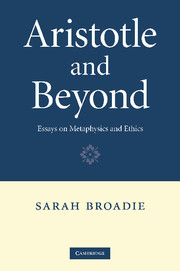Book contents
- Frontmatter
- Contents
- Preface
- Acknowledgments
- Chapter 1 Affecting and being affected
- Chapter 2 Backwards causation and continuing
- Chapter 3 From necessity to fate: An inevitable step?
- Chapter 4 Alternative world-histories
- Chapter 5 A contemporary look at Aristotle's changing Now
- Chapter 6 Nature and craft in Aristotelian teleology
- Chapter 7 Soul and body in Plato and Descartes
- Chapter 8 Aristotle and contemporary ethics
- Chapter 9 On the idea of the summum bonum
- Chapter 10 What should we mean by ‘the highest good’?
- Chapter 11 The good of practical beings: Aristotelian perspectives
- Chapter 12 Taking stock of leisure
- References
- Index of names
Chapter 8 - Aristotle and contemporary ethics
Published online by Cambridge University Press: 25 June 2009
- Frontmatter
- Contents
- Preface
- Acknowledgments
- Chapter 1 Affecting and being affected
- Chapter 2 Backwards causation and continuing
- Chapter 3 From necessity to fate: An inevitable step?
- Chapter 4 Alternative world-histories
- Chapter 5 A contemporary look at Aristotle's changing Now
- Chapter 6 Nature and craft in Aristotelian teleology
- Chapter 7 Soul and body in Plato and Descartes
- Chapter 8 Aristotle and contemporary ethics
- Chapter 9 On the idea of the summum bonum
- Chapter 10 What should we mean by ‘the highest good’?
- Chapter 11 The good of practical beings: Aristotelian perspectives
- Chapter 12 Taking stock of leisure
- References
- Index of names
Summary
INTRODUCTION
In the twenty-three centuries of Western thinking since Aristotle, the subject called ‘ethics’ has grown to embrace many more topics than Aristotle took account of under this or any title. Many of our own central preoccupations in ethics are with questions on which, for one or another reason, Aristotle has little or nothing to say. This is worth emphasising. Because of Aristotle's pre-eminent greatness and the reach and power of his ancient authority, unwarned readers of his Ethics may simply take it for granted that in this or that important modern debate there is a theory of which Aristotle holds a version, or a side which he is recognisably on. Such assumptions are all the easier to slip into because so much of what he does have to say in his Ethics continues to shape our own thinking on those particular matters, and so much of it comes in direct answer to questions whose universal relevance is as obvious in our day as it would have been in his. What is more, because so much of what he has to say in his Ethics tends to seem to us extraordinarily sensible as well as illuminating, we can easily fail to absorb how unusual some of his presuppositions are by today's philosophical standards. In this essay I shall be bringing out some of the differences between Aristotle's concerns in ethics and contemporary concerns. However, there are parts of our Aristotelian legacy that we can wholeheartedly continue to endorse, and also parts from which we may be able to learn more than we have learned so far.
- Type
- Chapter
- Information
- Aristotle and BeyondEssays on Metaphysics and Ethics, pp. 113 - 134Publisher: Cambridge University PressPrint publication year: 2007



